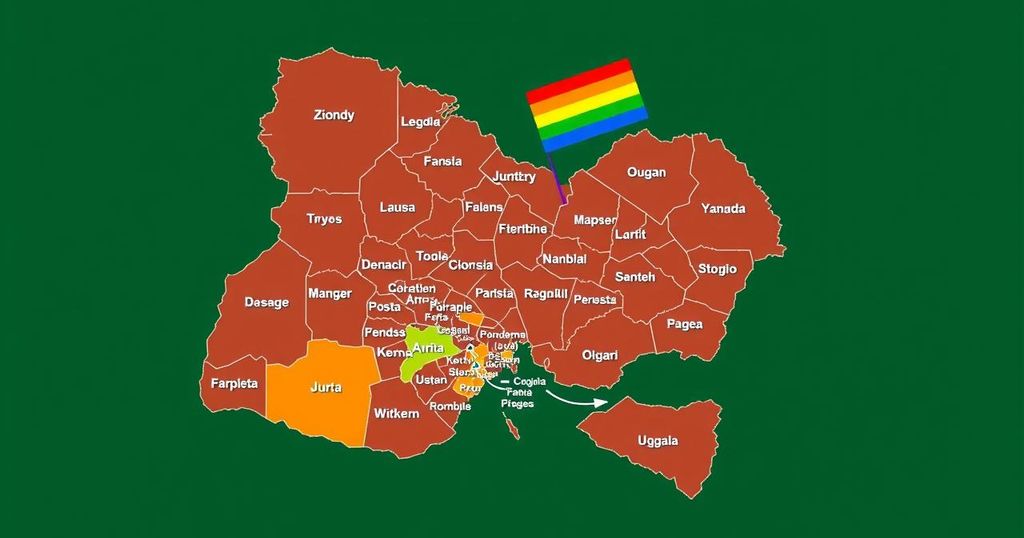A report by Open for Business reveals that Uganda’s Anti-Homosexuality Act has cost the country between $470 million and $1.6 billion in its first year, with potential losses of $2.3 billion to $8.3 billion over five years if not repealed. The law has severely impacted key sectors such as tourism and healthcare, and has drawn international condemnation, leading to significant foreign aid and investment reductions.
A recent analysis conducted by Open for Business has determined that Uganda, following the enactment of its Anti-Homosexuality Act, has potentially incurred financial losses ranging between $470 million and $1.6 billion within a single year. This staggering figure represents approximately 0.9% to 3.2% of Uganda’s gross domestic product (GDP). The report cautions that should this legislation remain in effect, the nation may experience cumulative economic losses estimated between $2.3 billion and $8.3 billion over the next five years. The report identifies eight key sectors significantly affected by the anti-LGBTQ law: international aid, foreign direct investment, tourism, national reputation, public health, national productivity, legal and policing expenses, as well as workforce attrition. Specifically, tourism could see losses between $9 million and $99 million due to diminishing reputational standing among Western nations. The decline in independent productivity linked to challenges faced by LGBTQ workers could cost the nation between $23 million and $58 million due to mental health struggles and absenteeism. Moreover, an estimated 5,000 to 15,000 LGBTQ individuals may seek refuge from persecution, leading to a projected productivity loss ranging from $3 million to $24 million. The ramifications of the law on healthcare services specializing in LGBTQ health and HIV prevention are also concerning, with anticipated financial burdens associated with untreated HIV possibly reaching between $70 million and $312 million. This legislation, enacted in May 2023 by President Yoweri Museveni, includes severe penalties—including life imprisonment for same-sex relations and a death sentence for what is categorized as “aggravated homosexuality.” Uganda’s Constitutional Court has largely upheld this law while nullifying certain components deemed unconstitutional, such as penalties against individuals not reporting suspected homosexual acts. The law has drawn widespread condemnation from human rights advocates globally, including notable figures such as U.S. President Joe Biden and Pope Francis, who although traditionally opposed to same-sex marriage, have spoken against this specific legislation. Additionally, Uganda’s removal from the African Growth and Opportunity Act has the potential to cost the country significant financial support. The U.S. suspension could result in a loss of $500,000 in future tariff privileges. Compounding this setback, the World Bank has halted the provision of new loans to Uganda, estimating that such actions could withhold between $276 million and $1 billion in annual foreign aid, as these actions contradict the bank’s social values.
The Anti-Homosexuality Act, initiated by Ugandan lawmakers and signed into law by President Yoweri Museveni, has raised considerable concern among global observers regarding human rights and economic stability. The law establishes rigorous penalties for same-sex relationships and related activities, reflecting a broader atmosphere of intolerance towards LGBTQ individuals in Uganda. This report by Open for Business underscores the significant negative implications of the law on Uganda’s economy by highlighting losses in various sectors resulting from diminished international relations and internal productivity challenges. The context surrounding the law includes a backdrop of increasing global advocacy for LGBTQ rights and a pushback against regressive policies that jeopardize the well-being of minority communities.
The enactment of Uganda’s Anti-Homosexuality Act represents not only a severe setback for human rights in the country but also poses a substantial threat to its economic stability. The losses projected by the Open for Business report illustrate the far-reaching impacts of discriminatory legislation on various sectors of the economy, particularly in terms of international aid and investment. As the consequences of this law continue to unfold, the urgent call for repeal becomes ever more critical, not only for the welfare of vulnerable populations but also for the economic prosperity of Uganda.
Original Source: www.metroweekly.com







